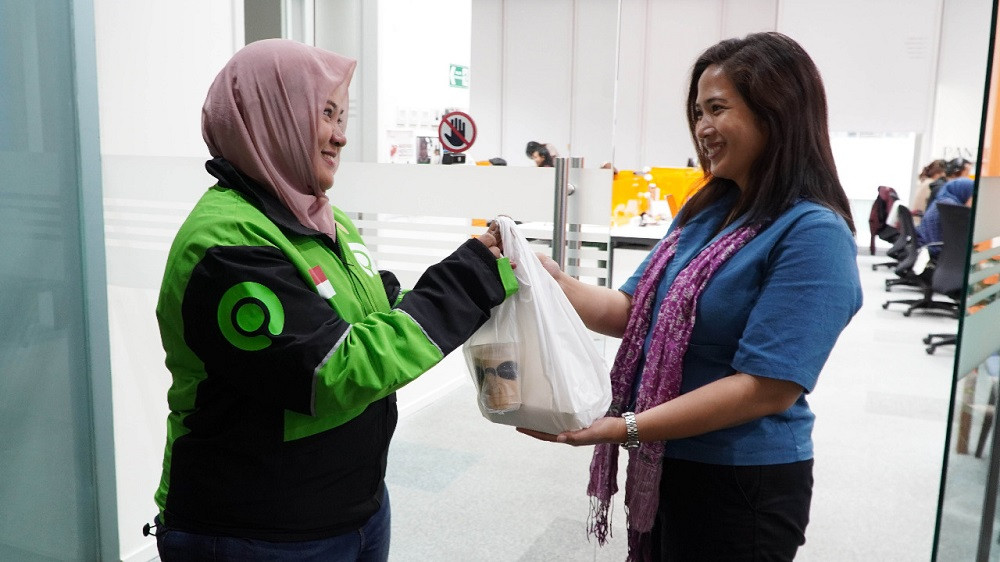Popular Reads
Top Results
Can't find what you're looking for?
View all search resultsPopular Reads
Top Results
Can't find what you're looking for?
View all search resultsGojek, Tokopedia secure funds, vote of confidence from big firms
Tokopedia has received an undisclosed sum of investment from tech giant Google and Singapore-based Temasek, its CEO and co-founder William Tanuwijaya announced on Monday.
Change text size
Gift Premium Articles
to Anyone
Two of Indonesia’s unicorn start-ups, ride-hailing service Gojek and e-commerce platform Tokopedia, have secured new funding from big companies, which might signal investors’ confidence in the country’s digital economy and reflect a maturing start-up ecosystem.
Tokopedia has received an undisclosed investment from tech giant Google and Singapore-based Temasek, its CEO and co-founder William Tanuwijaya announced on his personal Twitter account on Monday.
“We are pleased to welcome Temasek and Google as shareholders in Tokopedia. We are honored and grateful for their trust and support to the company and Indonesia,” William said in the statement. Temasek, on its Twitter account, confirmed the company’s investment in Tokopedia.
Meanwhile, Gojek also bagged $150 million in funding from Telkomsel, a subsidiary of Indonesia’s largest telecommunications company Telkom, according to a document filed by the latter’s parent company to Indonesia Stock Exchange (IDX) on Tuesday.
“This collaboration will accelerate Telkomsel's growth and our efforts to build an inclusive and sustainable digital ecosystem, which is particularly crucial amid the pandemic,” Telkomsel’s president director Setyanto Hantoro said in a statement on Tuesday.
He went on to say that users of both platforms could look forward to multiple initiatives, such as cost savings, joint promotions and product bundles. The companies would also collaborate on increasing advertising technology solutions for merchants.
The funding for Gojek and Tokopedia comes after both companies have stated plans to reach profitability amid a slowdown in funding for start-ups. Tokopedia CEO William Tanuwijaya said last year that the company would focus on reaching profit this year, while Gojek recently announced that its four core businesses booked positive contribution margins.
Five Indonesian start-ups, including Tokopedia and Gojek, are valued at more than $1 billion, yet, with their significant funding and soaring gross merchandise value (GMV), not one has recorded a profit.
"This agreement signifies a real vote of confidence in our platform model and our reach in Indonesia. It also puts us in an even better financial position as we look to navigate the years that lie ahead," Gojek co-CEO Andre Soelistyo said in a press release.
In June, Gojek announced that American tech companies Facebook and PayPal had invested undisclosed amounts in its funding round, making Gojek the first Indonesian company to receive investment from Facebook. Google has also previously invested in Gojek in 2018.
Meanwhile, valued at $7 billion, Tokopedia is currently backed by prominent investors including Chinese tech giant Alibaba Group, Sequoia Capital India and Japan-based SoftBank Group.
Institute of Development on Economics and Finance (Indef) economist Bhima Yudhistira said American tech firms were drawn to investing in local start-ups because Indonesia had ample room for growth in the digital economy.
For example, he said that digital payment penetration in the United States had reached 84 percent, while it was only around 40 percent in the Southeast Asia region.
“Right now, the Asian digital economy market is more prospective than that of the United States,” he told The Jakarta Post on Wednesday. “Plus, the pandemic has created a digital bonanza that pushes people to use more digital platforms.”
According to the e-Conomy SEA 2020 report by Google, Temasek and Bain & Co., Indonesia’s internet economy is projected to grow by 11 percent year-on-year (yoy) this year to US$44 billion. The figure is expected to reach $124 billion by 2025, making up a large portion of Southeast Asia’s projected $310 billion internet economy that year.
The study also suggests that mature and consolidated start-ups in the transportation, food and e-commerce sectors would likely not continue to obtain record funds but would instead shift toward profit.
Bhima predicted that mature players in the ride-hailing or e-commerce segment might go public next year to fund their businesses once market confidence returns following the recession.
However, there will still be plenty of funding for smaller start-ups in other segments, such as fintech, education tech and health tech, he said.
“This is a good sign. When strategic investors come in, they bring not only money but also knowledge,” he said in a statement on Tuesday. “The fact that Telkom joins the game is a very positive signal that a local big investor is getting involved, and we hope that others will join to invest in start-ups.”
He went on to say that foreign investment in the country would hopefully trigger desire from local big investors to become more active in start-up funding.










